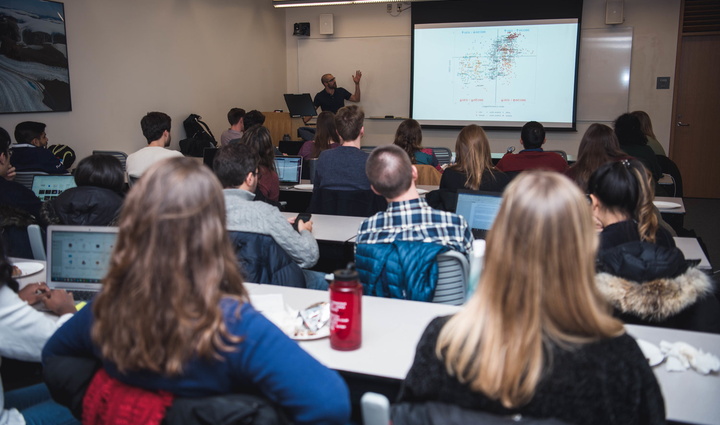Spring Intensives Build On-Ramps to Tech Skills
This spring, two Intensives welcomed students from across Yale’s campus to explore key technical skills and concepts.

The Data for Impact 101 Intensive, led by environmental innovation fellow Sophie Janaskie, gave students an introduction to data analytics tools, complementing hands-on skills development with a focus on how to use data for positive impact. The Paper to Prototyping: App Design Basics Intensive, led by mentor-in-residence Ellen Su, offered a no-programming-necessary crash course in designing, prototyping, and testing apps, guiding students through the process of translating their app ideas into interactive mockups.
DATA FOR IMPACT 101
"This Intensive came out of series of conversations and ideation sessions: what we thought would be a beneficial program and experience for students, at the intersection of data and social impact," said Janaskie as the program got started earlier this spring. The vision Janaskie developed with the Intensive’s co-leader, Sam Faries (MEM ’19), was grounded in the fabric of the university: many Yale students work with topics or themes that connect to data in some way, from historical analysis to environmental fieldwork. "Ultimately,” explained Janaskie, “the Intensive provides an on-ramp for students...to amplify or inform the work they do in those areas."
The Intensive’s four sessions included conversations on challenges in data analytics and workshops with Yale guest speakers who approach data from diverse angles. For example, Tiffany Li, fellow at Yale Law School’s Information Society Project, spoke on data ethics, bringing in considerations like intellectual property, ethical questions around artificial intelligence and algorithms, and accessibility. As they moved through the program, students also got first-hand experience working with datasets in Python, learning technical basics in a series of modules.
The Intensive’s participants planned to work with data in diverse fields. Lekha Tlhotlhalemaje (YC '19), for example, said, “I’m hoping to do social justice or environmental justice work in the future. I think that data analysis and exploration is a really useful skill for that. There is so much data about these issues; it's an important skill to be able to critically analyze it in an ethical and well-informed way.” She noted that her senior thesis involved working with a land rights organization that had done a regional census of farmers; she was eager to explore new ways of analyzing the resulting data. She also saw the Intensive’s potential impact extending beyond specific projects, explaining, “Given the access of data in everyday life, I think these skills will hopefully help me understand things that I read, and information that I receive, in a more critical way.”
PAPER TO PROTOTYPING: APP DESIGN BASICS
As she developed the Paper to Prototyping: App Design Basics Intensive, Ellen Su, a Yale College alumna who co-founded Wellinks, drew from her own experience. “I taught myself app design, and did a lot of graphic design and typography,” she says. “There was so much I had to teach myself for the practical skills.” Su points out that design is a useful tool for anybody to know, whether they’re just trying to move forward on an idea or they’re interested in turning design into a career. As she planned her Intensive, she also aimed to incorporate some of the process-focused skills she had gained as an art major at Yale, such as giving and receiving effective feedback.
The resulting Intensive welcomed students who had ideas for apps but didn’t know how to turn those ideas into reality. Over four sessions, participants explored basic elements like storyboarding, wireframing, and building visual identities and brands as they built app mockups in Adobe XD. The sessions covered both software how-tos and fundamental concepts for user experience and design. In a session on wireframing (low-fidelity prototyping of an app’s “skeleton"), Su prompted the students to ask key questions: What are the actions a user is taking? What are the flows through the app? She explained that working with rough prototypes allow a designer to leave aside questions like font and color, allowing them to clarify their workflow and refine the app’s core interactions before diving into other details.
In the Intensive’s final session, students gathered to test out their app mockups and get feedback, both from their peers and from "special guest" developers and designers from the New Haven area. Guests included Tom Nasser, product strategy and design partner for Checkmate Digital; Erick Rios, director of engineering for Big Bang; and Eric Duong, CTO of 2018 CITY Summer Fellowship team Homecooked.
As the Intensive wrapped up, Su reflected on the diversity of the projects students had worked on. “Overall, there were 15 projects going on,” she said. “One who got really far was an app meant to connect Yalies with mental health resources; another was a music training app for both kids and adults. Some other examples were an app to categorize things in their closet, a digital way to browse clothes, a daily journaling app, and a venture working on resources and support for homeless youth in New Haven.” For the teams behind many of these projects, the end of the Intensive did not mean the end of the project: several are planning to keep developing their ideas, moving from mockups to functional, thoughtfully designed user experiences.